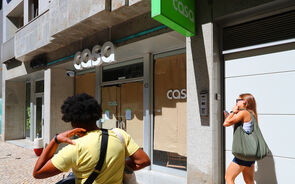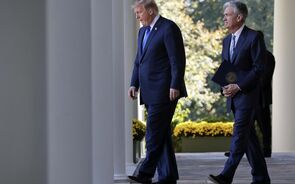"Something is seriously wrong in Europe" (S. Roac
1 Mensagem
|Página 1 de 1
"Something is seriously wrong in Europe" (S. Roac
En route back to China, I can't get Europe out of my mind. Most of my international travel in early 2004 has been spent hopping back and forth across The Pond to the UK and the Continent. In a series of four such visits in the first ten weeks of this year, I have met with a broad cross-section of European investors, corporate executives, and government officials. I've never seen Europe in such bad shape.
The angst of Europe hardly comes as a surprise. It is deeply rooted in economics, demography, politics, and sentiment. The dream that was EMU is now turning into a long nightmare. A confluence of three developments has hit Europe especially hard in early 2004 — a currency shock, the lack of fiscal discipline, and now, tragically, terrorism. Europe is falling behind in a fast-changing world, and the hopes for a catch-up are fading rapidly. Europeans are increasingly caught up in a deep sense of resignation when pondering the future.
The latest economic trends speak for themselves. The global economy appears to have sprung back to life in the second half of 2003. By our reckoning, world GDP growth hit 5–5.5% in the final two quarters of last year — double the anemic trends of 2001–02 and probably the fastest run rate for the global economy since 1984. Putting aside the key issue of sustainability, there can be no mistaking what has just transpired: The world has been firing on most of its cylinders. Gains averaged 6% in the US, 4.5% in Japan, and over 9.5% in China. Europe was the exception to this otherwise synchronous outbreak of resurgent global growth, with real GDP growth falling slightly short of 1.5% in the second half of 2003. And that was before the full force of the lagged impacts of the strengthening euro kicked in.
Europe's failure to participate in the latest global upswing only adds insult to injury. Something is seriously wrong in Europe, and the Europeans know it. At our recently concluded European Credit Summit in Florence — an annual gathering of fixed income investors and corporate issuers — we held a breakout session on "The Future of EMU." As the paid provocateur, I stressed the European speed dilemma: Yes, Europe is definitely changing, I noted. But the pace of change is far too slow in this increasingly fast-moving, IT-enabled world. As a result, I argued that Europe was falling further behind on a relative basis.
Eric Chaney, co-head of our European economics team, took the other side of this debate. His basic point is that Europe will have no choice other than to respond to pressure — pressure that is now building on several fronts, especially the currency, imminent EU enlargement, and the special weakness now evident in Germany. Eric drew comfort from the new mind-set of a younger generation of European leaders, the likely demise of the region's deeply entrenched social contract, and the efficiencies of a common defense policy.
But we kept coming back to the issue of speed. On this point, the reaction of the Europeans says it all. Certainly, change is not easy to come by in a long rigid society. Yet Europe believes it is not being given any credit for its steadfast commitment to reform, however excruciating the progress may be. This is increasingly frustrating for Europeans. As one client put it to me when he cornered me after the breakout session, "You Americans don't get it. We are changing." As an editorial aside, I would add that there was great emphasis on the word "are."
My point on speed is largely one of context. In an increasingly integrated global economy, it is critical to assess speed in relative rather than absolute terms. And in today's world, the parameters of such relative speed are very largely determined by an economy's IT-enabled growth characteristics. And there can be no mistaking Europe's lagging performance on that count. Eric Chaney was quick to concede that IT production of hardware and software combined currently accounts for only about 3% of Euroland GDP — less than one-third the roughly 10% share in the US. He also notes that Europe is behind the US in IT usage, with the IT portion of the EU's capital stock (23%) still lagging that of a post-bubble US (where the IT share of the capital stock has now been reduced to about 25%). Nor is there any encouragement on the productivity front: Labor productivity in Europe went from 2% in the 1980s to 1% since the mid-1990s — precisely the opposite of the stunning acceleration in US productivity over the same period.
Notwithstanding my own critique of America's IT excesses, I would be the first to concede that the adaptability to new technologies is the essence of economic flexibility. The US might have gone too far down this road in the bubbly late 1990s, but IT-enabled transformation has now become a way of life in America. This also shows up in global offshoring trends. Our Indian economist, Chetan Ahya, points out that India's IT-enabled export services industry has an astonishing US-centric tilt, with 69% of the business going to the US versus 22% to Europe and only 5% to Japan. Sure, there's a language bias that ties English-speaking America and India together. But the bulk of the first wave of offshoring has been more on the data processing front, where language is not really an issue. Yet that's not all. Recently, Mary Meeker showed me a tabulation of traffic rankings of the world's most popular global websites; according to the so-called Alexa tally, 11 of the top 25 were based in the US, 7 in China, 6 in Korea, and 1 in Japan. Europe didn't even make the cut.
I am struck by the irony of it all. In the end, the Internet is all about the open architecture of increasingly flexible production paradigms — platforms that not only provide new efficiency options but transparent and real-time linkages to the latest in technological breakthroughs. The fixed costs of IT-enabled connectivity are not cheap, but the marginal costs are close to zero. Economies that lag in IT acceptance could lose the competitive battle of our generation. That's a growing risk in Europe, a region that still clings to what is almost a cultural resistance to IT-enabled change. That's my basic point on speed: I agree with our client who insisted that Europe is changing. But the heavy lifting of absolute change is simply not enough for Europe — it is rapidly falling behind on a relative-change basis in this IT-enabled world. Sadly, most Europeans don't get that.
There's an even darker side to this tale — a resentment building between Europe and America. It started out in the trade arena, where frictions have been building steadily over the past several years. It broke out into the open a year ago over the war in Iraq. Sadly, there has been no healing in the postwar climate. At least that's the verdict of the recently completed update of the nonpartisan poll of the Pew Research Center, which found that European distrust of America has increased markedly since the official end of the hostilities in Iraq (see http://people-press.org/). In a survey conducted before the Madrid bombings from late February to early March 2004, US "favorability ratings" fell to 38% in Germany (from 45% after the Iraq War in May 2003), to 37% in France (from 43%), and even to 58% in the United Kingdom (from 70%). And then there is the ghastly carnage of the latest outbreak of terrorism and the equally stunning aftershocks in the Spanish political arena. I was in Europe when 9-11 hit and also there during 3-11. For a fleeting moment two and a half years ago, Europe opened up its heart to a wounded America. That moment has passed. Europe feels very much alone these days. Its economic malaise is being compounded by mounting geopolitical instability. The risk is that old wounds are re-opened in a Europe that knows all too well the tragedy and suffering of war.
The optimist draws comfort from a Europe that responds constructively to such pressures. The pessimist worries more about a Europe that turns inward and the isolationism that spawns. The realist stresses that the current state of affairs is simply not sustainable. And that leads to the biggest question of all for a beleaguered Europe: What gives?
The angst of Europe hardly comes as a surprise. It is deeply rooted in economics, demography, politics, and sentiment. The dream that was EMU is now turning into a long nightmare. A confluence of three developments has hit Europe especially hard in early 2004 — a currency shock, the lack of fiscal discipline, and now, tragically, terrorism. Europe is falling behind in a fast-changing world, and the hopes for a catch-up are fading rapidly. Europeans are increasingly caught up in a deep sense of resignation when pondering the future.
The latest economic trends speak for themselves. The global economy appears to have sprung back to life in the second half of 2003. By our reckoning, world GDP growth hit 5–5.5% in the final two quarters of last year — double the anemic trends of 2001–02 and probably the fastest run rate for the global economy since 1984. Putting aside the key issue of sustainability, there can be no mistaking what has just transpired: The world has been firing on most of its cylinders. Gains averaged 6% in the US, 4.5% in Japan, and over 9.5% in China. Europe was the exception to this otherwise synchronous outbreak of resurgent global growth, with real GDP growth falling slightly short of 1.5% in the second half of 2003. And that was before the full force of the lagged impacts of the strengthening euro kicked in.
Europe's failure to participate in the latest global upswing only adds insult to injury. Something is seriously wrong in Europe, and the Europeans know it. At our recently concluded European Credit Summit in Florence — an annual gathering of fixed income investors and corporate issuers — we held a breakout session on "The Future of EMU." As the paid provocateur, I stressed the European speed dilemma: Yes, Europe is definitely changing, I noted. But the pace of change is far too slow in this increasingly fast-moving, IT-enabled world. As a result, I argued that Europe was falling further behind on a relative basis.
Eric Chaney, co-head of our European economics team, took the other side of this debate. His basic point is that Europe will have no choice other than to respond to pressure — pressure that is now building on several fronts, especially the currency, imminent EU enlargement, and the special weakness now evident in Germany. Eric drew comfort from the new mind-set of a younger generation of European leaders, the likely demise of the region's deeply entrenched social contract, and the efficiencies of a common defense policy.
But we kept coming back to the issue of speed. On this point, the reaction of the Europeans says it all. Certainly, change is not easy to come by in a long rigid society. Yet Europe believes it is not being given any credit for its steadfast commitment to reform, however excruciating the progress may be. This is increasingly frustrating for Europeans. As one client put it to me when he cornered me after the breakout session, "You Americans don't get it. We are changing." As an editorial aside, I would add that there was great emphasis on the word "are."
My point on speed is largely one of context. In an increasingly integrated global economy, it is critical to assess speed in relative rather than absolute terms. And in today's world, the parameters of such relative speed are very largely determined by an economy's IT-enabled growth characteristics. And there can be no mistaking Europe's lagging performance on that count. Eric Chaney was quick to concede that IT production of hardware and software combined currently accounts for only about 3% of Euroland GDP — less than one-third the roughly 10% share in the US. He also notes that Europe is behind the US in IT usage, with the IT portion of the EU's capital stock (23%) still lagging that of a post-bubble US (where the IT share of the capital stock has now been reduced to about 25%). Nor is there any encouragement on the productivity front: Labor productivity in Europe went from 2% in the 1980s to 1% since the mid-1990s — precisely the opposite of the stunning acceleration in US productivity over the same period.
Notwithstanding my own critique of America's IT excesses, I would be the first to concede that the adaptability to new technologies is the essence of economic flexibility. The US might have gone too far down this road in the bubbly late 1990s, but IT-enabled transformation has now become a way of life in America. This also shows up in global offshoring trends. Our Indian economist, Chetan Ahya, points out that India's IT-enabled export services industry has an astonishing US-centric tilt, with 69% of the business going to the US versus 22% to Europe and only 5% to Japan. Sure, there's a language bias that ties English-speaking America and India together. But the bulk of the first wave of offshoring has been more on the data processing front, where language is not really an issue. Yet that's not all. Recently, Mary Meeker showed me a tabulation of traffic rankings of the world's most popular global websites; according to the so-called Alexa tally, 11 of the top 25 were based in the US, 7 in China, 6 in Korea, and 1 in Japan. Europe didn't even make the cut.
I am struck by the irony of it all. In the end, the Internet is all about the open architecture of increasingly flexible production paradigms — platforms that not only provide new efficiency options but transparent and real-time linkages to the latest in technological breakthroughs. The fixed costs of IT-enabled connectivity are not cheap, but the marginal costs are close to zero. Economies that lag in IT acceptance could lose the competitive battle of our generation. That's a growing risk in Europe, a region that still clings to what is almost a cultural resistance to IT-enabled change. That's my basic point on speed: I agree with our client who insisted that Europe is changing. But the heavy lifting of absolute change is simply not enough for Europe — it is rapidly falling behind on a relative-change basis in this IT-enabled world. Sadly, most Europeans don't get that.
There's an even darker side to this tale — a resentment building between Europe and America. It started out in the trade arena, where frictions have been building steadily over the past several years. It broke out into the open a year ago over the war in Iraq. Sadly, there has been no healing in the postwar climate. At least that's the verdict of the recently completed update of the nonpartisan poll of the Pew Research Center, which found that European distrust of America has increased markedly since the official end of the hostilities in Iraq (see http://people-press.org/). In a survey conducted before the Madrid bombings from late February to early March 2004, US "favorability ratings" fell to 38% in Germany (from 45% after the Iraq War in May 2003), to 37% in France (from 43%), and even to 58% in the United Kingdom (from 70%). And then there is the ghastly carnage of the latest outbreak of terrorism and the equally stunning aftershocks in the Spanish political arena. I was in Europe when 9-11 hit and also there during 3-11. For a fleeting moment two and a half years ago, Europe opened up its heart to a wounded America. That moment has passed. Europe feels very much alone these days. Its economic malaise is being compounded by mounting geopolitical instability. The risk is that old wounds are re-opened in a Europe that knows all too well the tragedy and suffering of war.
The optimist draws comfort from a Europe that responds constructively to such pressures. The pessimist worries more about a Europe that turns inward and the isolationism that spawns. The realist stresses that the current state of affairs is simply not sustainable. And that leads to the biggest question of all for a beleaguered Europe: What gives?
- Mensagens: 195
- Registado: 11/12/2002 2:48
- Localização: Paço de Arcos
1 Mensagem
|Página 1 de 1
Quem está ligado:
Utilizadores a ver este Fórum: ASimoes, Bar38, cftomas, Google [Bot], icemetal, iniciado1, latbal, m-m, malakas, maturidade, nunorpsilva, O Magriço, Olhar Leonino, Pmart 1, Purificaçao e 68 visitantes


